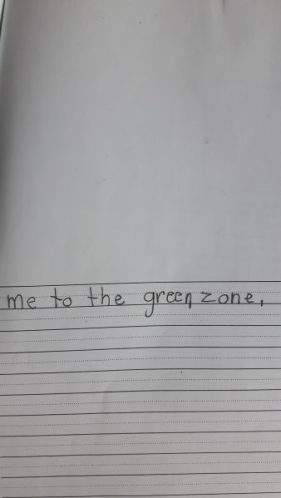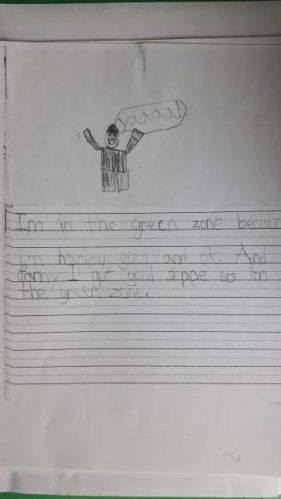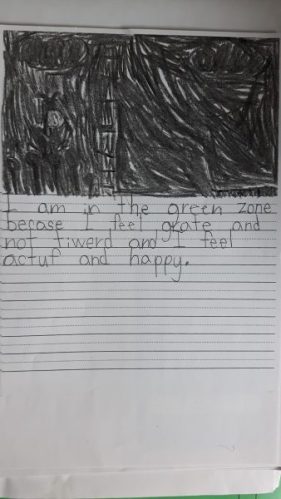Part 1: Analysis of Context
1. What do we know about our learners?
Jessie Lee is a supportive place for students. They benefit from teachers and support staff who are very knowledgeable in understanding what students need to learn; their personal, social, and academic needs are all attended to. A majority of our students attend Jessie Lee for most of their elementary school years, while others come for our Late French Immersion program from various schools and attend only in Grades 6 and 7. The BC Core Competencies have become a focus for our staff as they work to move student learning forward. In particular, our emerging understanding of the Personal and Social competencies have prompted us to begin examining to what degree these are developing in our students, and the effect on their overall learning. Over time, our staff has noticed that while our students are learning about ways to understand, reflect on, and manage themselves and their relationships with others, they are not consistently doing what they know. In addition, we noticed that while students are able to demonstrate academic knowledge in traditional ways (ie written work, individual assignments) they participate less in activities requiring cooperation, collaboration, and discussion. This led us, in May 2016, to asked ourselves, “What is keeping our students from applying their knowledge when peers are involved?” From past surveys and interviews with students, we know:
- that students place a high value on their peer relationships. This is a main reason that they tell us they come to school each day. This is more evident in intermediate grades. Students named peers three times more frequently than adults as people who believe in them.
- that peers also detract from learning. Students say that “people talking to me” makes it hard to learn, and there are issues at break times and out of school that affect students during learning time. This is equally a concern among primary and intermediate students.
- that intermediate students are more reluctant to take risks by answering questions, discussing topics, and explaining their thinking in class.
2. What evidence supports what we know about our learners?
Our staff inquiry group created a new survey to address questions around academic and social engagement of students. We asked questions addressing both these areas to students in a sample of classes from grades 1 to 7.
To gather information on academic engagement, the survey asked students how they like to learn, how they know they are improving in their learning, how they use teacher or peer feedback, and how they reflect on their own learning.
In primary grades (1-3), students told us:
- they like to learn using media, technology and hands-on activities
- they like to try things for themselves
- they’re not sure how to know if they’re improving at something
- they look at being able to do something and compare their work over time as feedback on their learning.
In intermediate grades (4-7), students told us:
- they prefer social learning to technology-based activities
- they enjoy investigation and experimentation
- they use feedback to revise and improve their work
Students’ social engagement was assessed using questions as to what students felt appreciated for/appreciated in others, what they felt the main nature of their peer relationships in class were characterized by (ie competition, support, exclusion, etc.), their views of roles in group learning activities, and what makes it difficult to work and get along with others.
Our primary students told us:
- they see themselves as caring and including others, yet see others as not caring about them in equal measure
- that being included and feeling appreciated is a very important factor in their social world at school.

Our intermediate students said:
- they appreciated many qualities of others but struggled to state what others appreciate about them.
- they value adult support and boundaries to feel safe and supported in social relationships
- they don’t know if others are sincere when they give compliments or positive feedback
Part 2: Focus and Planning
3. What focus emerges as a question to pursue?
From the student responses, the following questions emerged as the focus of our inquiry:
- How can direct teaching of students’ self-awareness strategies affect their social interactions?
- What effect will teaching students how to give and receive feedback based on specific learning criteria have on their levels of trust and engagement in learning with and from others?
4. What professional learning do we need?
Teachers and staff want to learn more about the resources available to support this learning with students. For self-awareness: Zones of Regulation, MindUp, Second Step and the Personal Awareness core competencies and profiles. For student feedback and peer support: Embedded Formative Assessment (Dylan William), Grade Smarter, Not Harder (Myron Dueck), Creating Independent Student Learners (Clarke/Owen/Sutton). Teachers may attend professional learning opportunities through the school district, such as “Formative Assessment 1.0” and “2.0”.
5. What is our plan?
- Teachers will select one academic area (ie writing) through which to teach students the language of metacognition and feedback. This will be done through a cycle of declaring learning intentions, enunciating clear criteria with students, modeling and practicing the giving and receiving of feedback, and applying it to student learning.
- Teachers will build students’ knowledge and awareness of the personal and social competencies through the “Notice it – Name it – Nurture it” strategy.
- Teachers will implement a resource of their choosing based on its appropriateness for their class (ie Second Step, MindUp, Zones of Regulation).

Part 3: Reflect, Adjust, Celebrate
6. How will we know our plan is making a difference? (evidence / success criteria)
Teachers collect evidence in a variety of ways.
- Students reflect on their learning in journals that may include drawing and writing. Teachers provide prompts using the core competency language that they are teaching – such as “I can” statements, students’ understanding of where they are in their learning, their goals, and successes.
- Teachers observe students in their application of skills related to their social and academic engagement. For example, while students are discussing a project and giving feedback to their peers, the teacher will circulate and notice what students are applying and what they may still need more practice to accomplish.
7. Based on the evidence, does our inquiry require adjustment?
Teachers began evidence collection during the spring of 2017. Based on observations and collection of student work, teachers have begun to notice changes in the attitudes and behaviours of students around the goal areas. We believe that these goals are important and that work should be ongoing during the next school year(s). One area for continued improvement is consistent use of the resources such as the Second Step and Zones of Regulation programs to give students opportunities to learn and practice their skills and understanding.
Grade 2 students wrote regular journal entries describing what “zone” they were in at that moment and what strategies they might use to regulate to the green zone in order to be more ready for learning.





Another example of students’ learning about metacognition and understanding their own thinking about their learning is encapsulated in this anecdote from a staff member:
“I was working with some primary students in the library, where different patterns and materials for origami were laid out. I joined in at one of the stations and started following the visual pattern to create an origami animal. After a couple of steps I was stumped. A student next to me asked what I was making, so I showed him the pattern and told him that I wasn’t very good at figuring out picture instructions, so I didn’t think it was going to work. He looked me in the eye and said, “You can’t just quit when something is hard. That’s a fixed mindset. You need to have a growth mindset and ask for help or try again. You don’t just give up!” I realized how much I had to learn from this young student about my own learning and success!”

